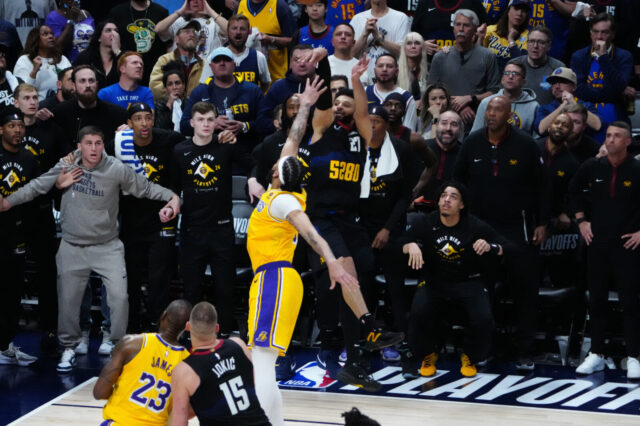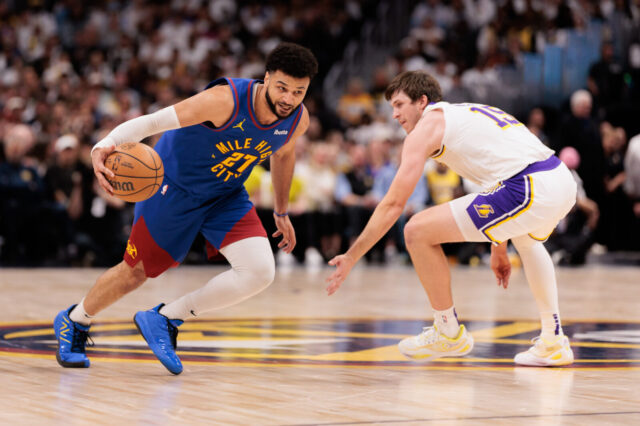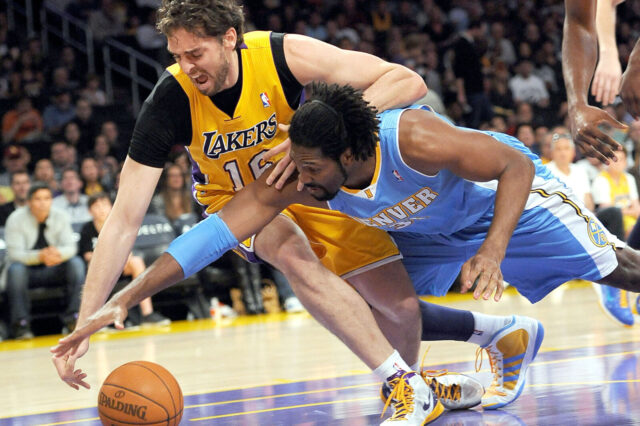As the Denver Nuggets conducted their business during Day 1 of Free Agency, the expected reunions of Will Barton and at least one of their backup bigs, JaMychal Green, occurred early in the proceedings. Two-year deals for both players (including another player option for JaMychal, who I’m going to start calling JaMychal in articles now for obvious reasons) showcased a level of self-belief in where the Nuggets currently stand as well as needed discipline from the front office. The Nuggets believe themselves to be a title contender, but they also know there are significant financial implications to signing long term deals for role players, especially two guys on the other side of 30.
Barton and JaMychal will help maintain the continuity, especially with Jamal Murray currently sidelined. The Nuggets knew they needed to add scoring punch to survive the 2021-22 regular season. Rather than place all of the pressure on Michael Porter Jr. to improve his ball handling and facilitation in a short period of time, the Nuggets brought back Barton, who averaged better individual numbers when Murray wasn’t on the floor:
This content is no longer available.
JaMychal, on the other hand, will most likely reprise his role as the fifth member of Denver’s frontcourt rotation. Behind Nikola Jokić, Michael Porter Jr., and Aaron Gordon, the Nuggets found stability with Green as a pick-and-pop big man who could play next to or instead of Jokić. Green hovered around 19 minutes per game in the regular season and playoffs, giving Denver solid all-around minutes on both sides of the ball. His ability to switch defensive assignments helped the Nuggets in the playoffs against the Portland Trail Blazers, who loaded up to win the starting minutes but left themselves vulnerable to Green and the bench. The Nuggets stuttered after that, but that could be attributed to Murray’s absence and a talent deficit in the backcourt.
But the Nuggets weren’t done making moves. A couple hours later, the notice that Jeff Green would be signing a two-year deal with the Nuggets came across the timeline and had several stunned. Jeff Green? Of the Brooklyn Nets? How? Why?
After being initially caught off guard, it’s easy to see why the Nuggets brought in Green, who is affectionately referred to as Uncle Jeff, perhaps due to his Twitter handle? In any event, Nets fans were unanimously upset that Green was leaving, which is generally a good sign that he was important to their organization.
But for the Nuggets? Why would they add Uncle Jeff specifically? In bringing back JaMychal, the Nuggets already have one backup big man initialed JG. Do they really need a second forward option who’s around the same size and would play a similar role?
In short, yes. Jeff Green is perhaps better than JaMychal Green and gives the Nuggets a different skill set to be utilized throughout the season. One that unlocks several lineup combinations for the Nuggets heading into the season.
Defensive Versatility
The Brooklyn Nets were a bad defensive team this past year, but they tightened up defensively in several instances when it mattered. Green’s team defense numbers don’t appear to be anything special on the surface, but looking more closely at the Nets’ flawed defensive lineups, it’s easy to see where he excels. Green put together a 110.0 defensive rating (+6.9 net rating) in 1,346 total regular season minutes with DeAndre Jordan OFF the floor. When the two shared the floor, the defensive rating leapfrogged to 118.3 (-7.8 net rating) in 490 minutes. A 110 defensive rating is perfectly reasonable, perhaps impressive when the majority of the Nets roster is filled with net neutral or minus defenders.
That’s because Jeff Green carried a heavy load, despite playing 27 minutes a night in his Age-34 season.
Throughout the year, Jeff Green was both small ball center and big wing stopper for the Nets. Basketball Reference estimated Green’s play-by-play numbers as having spent 57% of his 1,835 regular season minutes at power forward and 44% at center. Those numbers went to 19% and 81% respectively in 148 playoff minutes, though Green only played six games due to a minor foot injury.
In playoff games against Boston and Milwaukee, Green often spent time guarding star forwards Jayson Tatum, Khris Middleton, and Giannis Antetokounmpo. Listed at 6’8” and 235 pounds, Uncle Jeff was the premier option for the Nets against the best forwards in the NBA, and in a switch-heavy system, Green spend plenty of time on guards throughout the year as well. Though Green won’t be confused with the best playmaking forward defenders in the NBA, he was clearly a serviceable option during his time in Brooklyn.
Having the ability and mentality to switch everything has become extremely prevalent in the playoffs. The players slowly going out of style are the ones physically limited to defensive concepts that can be broken down by various means. The drop coverage center, the short point guard, and the individually weak defenders are being identified and punished consistently. Jeff Green won’t present those defensive issues, and he offers Denver the ability to mix and match various forwards at small forward, power forward, and even center consistently. A switching defensive scheme on the bench featuring P.J. Dozier, Jeff Green, JaMychal Green, Zeke Nnaji, is almost certainly going to be a factor heading into the year.
Athleticism
The biggest thing that stands out in film of Jeff Green in Brooklyn: he can still FLY at 35 years old.
The Nets used him in a variety of ways on the offensive end. He wasn’t just a standstill perimeter shooter but also attacked the rim, either off the catch or in sets using him as a screener. Green had 39 dunks in 68 regular season games last year, which would rank third highest on the Nuggets.
Green also played in transition frequently, averaging 1.36 points per possession in transition on 1.6 transition opportunities per game for the Nets last year, good for the 89th percentile in transition efficiency in the entire NBA. The Nets were a great transition team themselves. Whenever the Nets collected a rebound, they would consistently look for running opportunities, something Green was more than happy to do.
Green was used as a roll man fairly often for the Nets as well. Though he’s only 6’8” and truly a wing/forward playing a big man role, Green flourished with elite spacing around him and made the most of those opportunities. As a roll man, Green averaged 1.20 points per possession on another 1.6 roll man opportunities per game, good for the 68th percentile.
Watch Pascal Siakam on the play below:
Don’t forget Green’s ability to drive off of pick and pop opportunities as well. Given his outside shooting ability, opponents are forced to respect his jumper and react strongly when he’s in comfortable shooting position. Green often makes them pay with drives to the paint, getting fouled frequently in the process.
There will be uses for an athletic roll/pop man in Denver’s offense. Though there’s some overlap in the skill sets between Jeff Green, JaMychal Green, and Zeke Nnaji, all three bring different variations on the same role to the table. Uncle Jeff, for this team, is the athletic, rolling scorer in the halfcourt, utilizing effective moves and nuanced fakes to be efficient around the basket. He will be a favorite of Facundo Campazzo, who will be excited to learn about Uncle Jeff’s ability to slip screens and attack perimeter closeouts on the way to rim-rattling dunks.
Outside Shooting
As if the athleticism and defensive versatility weren’t enough to throw a contract offer at Uncle Jeff, the 14-year veteran had the best shooting season of his career last year, shooting 41.2% from three-point range in the regular season. This was wildly outside of Green’s career arc from an efficiency standpoint but still a very exciting development if it continues into his Nuggets tenure. Green was the beneficiary of countless open looks as opposing teams struggled to deal with the shooting of lineups featuring some combination of Kevin Durant, James Harden, Kyrie Irving, and Joe Harris. Green was quite clearly a lesser priority for defenses than those guys, and yet Uncle Jeff still made opponents pay for leaving him open.
Green settled into a role that was comfortable for him, setting up on the perimeter and taking advantage of his opportunities. The athletic forward shot 44.1% on catch-and-shoot threes for Brooklyn last year, one of the most efficient numbers in the NBA and right in between Malcolm Brogdon (44.3%) and Stephen Curry (43.7%). It’s probably fair to expect some regression, but anything above 40% is excellent. Green shot 35.4% on catch-and-shoot threes during the 2019-20 season split between Utah and Houston, and he shot 37.8% on C&S threes in Washington the year prior. If Green shoots it as well as he did in Brooklyn, he becomes one of the more valuable backup scoring forwards in the NBA.
In Denver, it’s clear that the Nuggets plan to plan 5-out offense on their bench unit. JaVale McGee has moved on to the Phoenix Suns, and Paul Millsap remains unsigned. The Nuggets have loaded up on shooting and versatility in their frontcourt with Uncle Jeff (44.1%), JaMychal (41.7%) and Zeke Nnaji (39.7%) all excelling as catch-and-shoot three-point shooters. Having fewer options for defenses to leave open on the perimeter will do wonders for Denver’s scoring when Jokić goes to the bench, opening up driving lanes for Denver’s guards and wings.
It may have seemed a curious signing at the time, but Jeff Green was a gem of a rotation player hiding in plain sight on a star-studded Brooklyn Nets team. He averaged 27.0 minutes, 11.0 points, 3.9 rebounds, and 1.5 assists per game. Behind the three superstars and Joe Harris, Green was the most important player on the roster due to his scoring, versatility, willingness to do the difficult things, and veteran mentality.
There’s a strong possibility that Uncle Jeff brings those same aspects to the Nuggets as a sixth man candidate. With Monte Morris stepping in for Jamal Murray as a starter, the Nuggets are in need of a consistent scorer, defender, and versatile contributor in a bench role. P.J. Dozier is one such candidate, while JaMychal Green is another.
Jeff Green, however, gives Denver the best of both aforementioned players. He can reasonably sub in for Michael Porter Jr. and give the Nuggets another quality forward shooter. Sub him in for Aaron Gordon and his role changes to guarding the opposing team’s best forward, saving Porter for scoring opportunities himself. Sub Uncle Jeff in for Jokić and watch as a front court of Porter, Gordon, and Jeff abuses teams in transition while switching everything defensively. He can do a variety of different things for a Nuggets rotation that may not have needed any one thing specifically but could still stand to improve across the board. Green gives the Nuggets another capable weapon to do so.
At this moment, it’s unclear what the addition of Uncle Jeff means to Zeke Nnaji, Denver’s 20-year-old soon to be second year player with a versatile forward skill set of his own at 6’11”. Likely the Nuggets are heading for a 10-man rotation that at full strength will see Austin Rivers and Zeke Nnaji battling for the last spot, depending on whether the opposing team’s rotation is small or big. It will be important for the Nuggets to continue to find opportunities for Nnaji to develop; however, much like Denver’s re-signing of Rivers preventing Michael Malone from needing rookie Nah’Shon Hyland to play immediately, the signing of Uncle Jeff gives the Nuggets a safety net of sorts for Nnaji. There will undoubtedly be opportunities for Nnaji throughout an 82-game regular season, but in the vent of an injury to one of Denver’s starters, this doesn’t put Nnaji and the Nuggets in an uncomfortable position of needing him to be more than he is.
As the Nuggets look to build the best possible team around Nikola Jokić, Jamal Murray, and Michael Porter Jr. that they possibly can, don’t be surprised if Jeff Green plays a larger role than expected. From all accounts, Green was an excellent addition to the Brooklyn Nets last year both on and off the court. The Nets needed players willing to assist their stars in different ways, and Green did so with his versatility, defensive engagement, and role player tendencies on the offensive end. He’s built for the rigors and variables of a playoff run, and the Nuggets know all too well how important it is to limit weaknesses in a playoff environment.
Don’t be surprised if Jeff Green plays a significant amount in the year to come.


